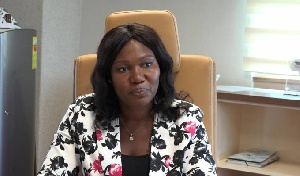 Deputy CEO of the Ghana Shippers
Deputy CEO of the Ghana Shippers
Deputy CEO of the Ghana Shippers' Authority (GSA), Sylvia Asana Owu, has lauded government’s quest to revamp the rail transport sector, saying would make the country’s ports more attractive neighbouring land locked countries, and ultimately open up the economy.
“An efficient rail system will open up our corridors for effective transit business; this will attract other countries to do business through our ports and that will create jobs for the people and open up the economy,” she told the B&FT.
“When transit cargo is moved through our ports, people will be engaged to work on the cargo; truckers will be involved to cart the goods along the transit routes; they will buy fuel and sleep in hotels. All these activities will generate incomes to the service providers and open up the economy, as money will come into the system.”
She expressed further delight in the fact that government has not lost interest in the Boankra Inland Port project, which has been on the drawing board for a long time.
The Boankra Inland Port and Eastern Line Railway Line project, is an inland extension to the Tema Port, aimed at making railway efficient, and to enhance Ghana’s role as a transit corridor.
“We have always believed that the Boankra Inland Port is a very good project that is why we have not given up on it; and it is equally significant that the Transport Ministry has not given up on it,” Sylvia Owu said.
“If there is a properly linked rail network to the Boankra Inland Port, it will boost trade on our corridor; so, rail is a laudable initiative that we need to focus on.
It is encouraging that we have a whole ministry to see to the development of the rail network; at the end of the day, if we are able to implement the rail network, it will go a long way to help.”
The significance of the inland port project is in the fact that a chunk of cargo throughput from the Tema and Takoradi ports makes its way to the Ashanti Region by road, for onward carting to the hinterlands and the landlocked countries of Burkina Faso, Niger and Mali.
According to players, the maritime industry has entered into the multimodal era, where multiple modes of carting goods are needed, especially rail, which is cheaper and can haul large volumes at a go.
An efficient rail transport network, similar to that of Cote d’Ivoire and Benin, will reduce cost for businesses in the landlocked countries of Niger, Burkina Faso and Mali.
Rail transport will consolidate the confidence Burkina Faso, Mali and Niger, already have in Ghana’s ports.
Transit trade figures over the last few years, have been impressive, as figures from the Ghana Shippers’ Authority (GSA) show that total transit and transshipment figures, as at the third quarter of 2016, stood at 772,744 metric tonnes, which is a 12.23 percent rise over the 2015 figure of 688,565 metric tonnes.
Currently, the haulage sector provides an average of 97,000 trucking jobs -- drivers and mates -- per year for the northbound transportation of transit cargo destined for the Sahelian countries, generating a yearly income in the range of US$81million for local haulage companies.